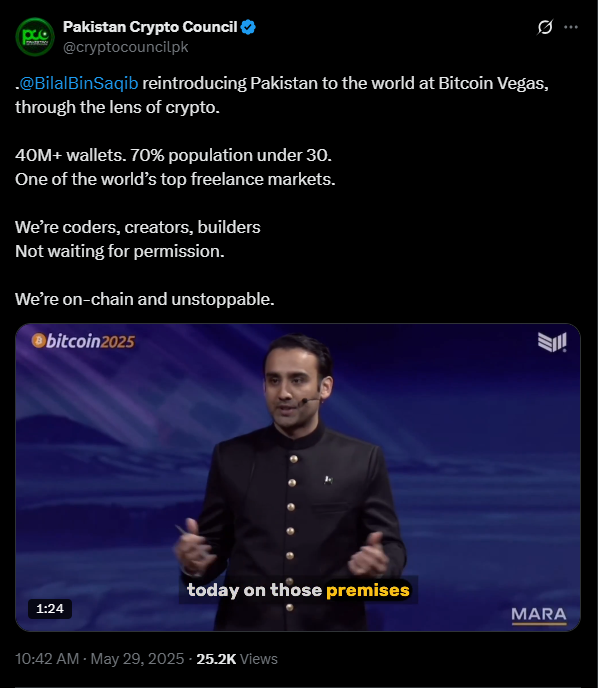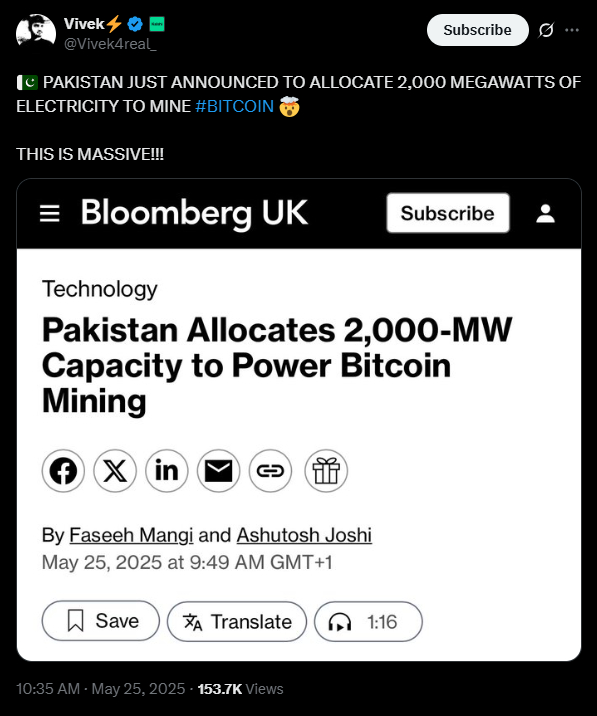Key Insights:
- Pakistan has just announced plans to establish a national Bitcoin reserve that will “never, ever be sold.”
- The government will allocate 2,000 megawatts of surplus energy for Bitcoin mining and AI data centers.
- This initiative is geared as a solution for over 100 million unbanked citizens through blockchain-based solutions.
South Asia has just experienced one of the biggest moves in its crypto history. Pakistan plans to create a national Bitcoin reserve. It will also allocate 2,000 megawatts of energy to crypto mining and AI data centers.
Bilal Bin Saqib, the country’s Minister of State for Blockchain and Crypto, revealed this ambitious strategy. Here’s what this means for the country’s blockchain and digital finance approach.
A Strategic Bitcoin Reserve for the Long Haul
The announcement was made during the Bitcoin 2025 conference in Las Vegas, where Saqib addressed worldwide crypto leaders. Pakistan is prepared to enter the global digital economy.
Saqib says the government will store its Bitcoin in an official wallet. Essentially, the asset will be treated as a long-term national resource rather than a speculative one.

Saqib pointed out that the bitcoins stored in the reserve would “never, ever be sold,” similar to the U.S. government’s developing Bitcoin reserve.
“This wallet, the national bitcoin wallet, is not for speculation or hype,” said Saqib. “We will be holding these bitcoins, and we will never, ever sell them.”
This stands as a significant change from Pakistan’s previous outlook toward cryptocurrencies. By establishing this reserve, the Pakistani government recognizes Bitcoin as a legitimate asset and a resource to solidify its economy.
Powering Growth with 2,000 Megawatts for Mining and AI
Pakistan is dedicating 2,000 megawatts of electricity to power Bitcoin mining operations and AI data centers. This move aligns with its broader plan to build a Bitcoin reserve.
This energy will be sourced from the nation’s surplus, which would otherwise go unused without the mining centers.

Pakistan’s mining and AI project is set to boost a high-tech industry with significant revenue potential. It could also draw substantial foreign investment.
Saqib invited international miners and infrastructure developers to participate in building this new initiative in Pakistan.
This move was intended to boost the economy, modernize Pakistan’s energy, and use the often wasted stranded power resources.
Financial Inclusion for Pakistan
Saqib highlighted the potential of cryptocurrency to transform Pakistan’s economy. With over 100 million unbanked citizens, it could be a key solution to the country’s financial inclusion crisis.
Regular banking systems have often been unable to reach large population segments, especially in rural areas. Because of this, the minister believes blockchain-based solutions could change that.
The government aims to tokenize illiquid assets and establish digital identity systems. It also plans to develop decentralized tools to drive long-term innovation.
A Regulator for Digital Assets
The government’s plans also include a regulatory framework to manage its crypto space. The Pakistan Digital Assets Authority (PDAA), recently approved by the Ministry of Finance, will be the official body overseeing the crypto sector.
Its responsibilities will include licensing and monitoring crypto exchanges, custodians, and tokenization platforms. Finance Minister Muhammad Aurangzeb described the PDAA as an essential part of Pakistan’s position as a hub for digital finance.
The agency is responsible for steering the development of DeFi tools. This includes enabling blockchain-based government debt issuance and other advancements.
Overall, whether these steps will deliver long-term benefits remains to be seen. Still, Pakistan is betting on Bitcoin much like the US is, and it is playing the long game.
